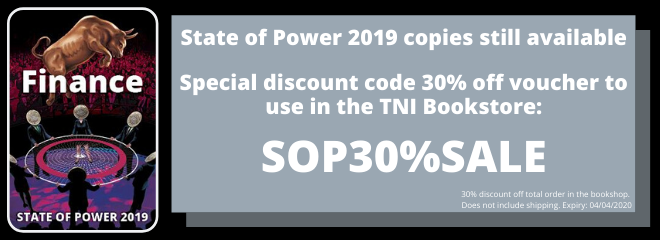|
|
|
The climate crisis is a manmade crisis that requires a feminist solution. An end to climate racism and climate sexism is the beginning of a new future. On this year’s International Women’s Day on March 8, TNI joins hands with other progressive forces worldwide to support a feminist call to action.
Nota: Este boletín se publica solo en inglés. Si quieres recibir el boletín en español, puedes darte de baja de esta lista y suscribirte en esta. ¡Gracias!
Dear reader,
Marginalized communities are disproportionately affected by the climate crisis; including indigenous communities, people of colour, and populations in the global South. Across all these communities, women bear the brunt of the impact.
The climate crisis is a manmade crisis that requires a feminist solution. An end to climate racism and climate sexism is the beginning of a new future. On this year’s International Women’s Day on March 8, TNI joins hands with other progressive forces worldwide to support a feminist call to action.
Read on for the latest publications from TNI.
|
|
|
|
|
|
|
|
This workshop report shares key outcomes and insights from a workshop which took place in Amsterdam in October 2019, where participants from a range of organisations met to discuss the history of their collaborations around Just Transition and the lessons learned so far.
Take a closer to find out how feminist and women’s movements; movements against racism; and fights for agrarian reform, peasant rights and food sovereignty, among others, have helped to lay the groundwork for discussions on the Just Transition.
Read more.
|
|
|
|
|
|
|
|
|
|
|
Towns and cities stand at the heart of the new public future. Between 2000 and 2019, there were over 1400 new cases of “municipalisation” or “remunicipalisation”, the creation of new public enterprises run by local governments or the return of privatised enterprises to municipal hands. This trend occurred across 2400 locales in 58 countries.
A democratic economy will necessarily align with feminist perspectives. Have a look at Step 6 in this document to find out how.
Find out more.
|
|
|
|
|
|
|
|
|
|
|
This publication compares Countering Violent Extremism (CVE) policies in Britain, France and the Netherlands - three European countries where Muslims form a minority. It also traces how, both through their overwhelming focus on Muslims, and by their nature as tools of lateral surveillance, they help institutionalise Islamophobic prejudice and suspicion.
Read more.
|
|
|
|
|
|
|
Smokable cocaines are commonly referred to as “the most harmful drug”, and considered not just a threat to public health, but also to public security in the urban centres of many large cities. As a result, its users are frequently subject to hostility and stigmatization.
|
|
|
|
|
|
|
As the peoples of Myanmar commemorate Union Day, Sai Wansai argues that “civic nationalism” can help address the crisis in "ethnic nationalism" that underpins state failure and the enduring cycles of conflict in the country. Seventy-three years after the historic Panglong Agreement brought the new Union into being, Myanmar is a land that is yet to achieve ethnic peace and political inclusion.
|
|
|
|
|
|
|
|
|
|
|
|
From Austria to Chile, Lagos to London, people are demanding policies that democratize economies and keep public resources in public hands. In just the last decade, more than 2,400 cities in 58 countries have brought privatized resources back under public control. Laura Flanders reports from Amsterdam at The Future is Public, a conference co-hosted by TNI that brings together hundreds of organizers, scholars, and government officials who are working to democratize their municipal and national economies.
|
|
|
|
|
| Here’s what we’re reading |
|
A creative look at income inequality
One billion dollars is a large sum of money. It is almost impossible to explain or show just how much money it is. Or is it? One tik tok user gives an illustration of how much a billion actually is. And further, he shows what multiple billions look like relative to sums we can understand. This is a very powerful illustration of wealth inequality.
Taxing the Super Rich
Gabriel Zucman and Emmanuel Saez explain why, for the sake of justice and democracy, we need a progressive wealth tax.
The long fight against Modi’s Hindu nationalist agenda
India under the BJP’s rule has seen a sharp turn to the right, with Muslims and other minorities being subjected to violence and oppression on a daily basis. What is the political context in which this is unfolding?
|
|
|
|
|
 |
| |
|
|
|
"If only we had the resources of those we are up against, we could change the world!" - TNI President Susan George
Every amount will make an impact towards the Transnational Institute. You can choose to make a once off gift or ongoing donation of support.
|
|
|
|
|
|
| | | | | |